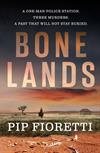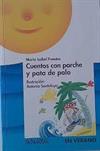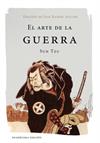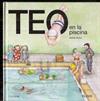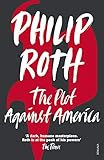
The Plot Against America
Registered by cluricaune of Armagh, Co. Armagh United Kingdom on 8/25/2007
 This Book is Currently in the Wild!
This Book is Currently in the Wild!
 This Book is Currently in the Wild!
This Book is Currently in the Wild!
2 journalers for this copy...
Charles Lindbergh is best known as the first person to fly solo across the Atlantic. However, he was also a noted isolationist and, prior to Japan's attack on Pearl Harbour, opposed any American involvement in the Second World War. Following the conviction of a German immigrant, Bruno Hauptmann, for the murder of Charles Jr, the Lindbergh family spend some time abroad, and become regular visitors to Germany in the late 1930s. Lindbergh refers to Hitler as “undoubtedly a great man”, and receives the Service Cross of the German Eagle in 1938 from Hermann Goring. He continues to defend Nazi Germany after the invasions of Czechoslovakia and Poland and – in a speech in Des Moines, in September 1941 – identifies “the Jewish race” as one of the most influential groups in pushing America towards war. These groups are looking to enter the war, Lindbergh claims, “for reasons which are not American”.
In real life, of course, Lindbergh’s views made no real difference. America declared war on Japan, Germany and Italy after the attack on Pearl Harbour and, having once been a revered hero, Lindbergh fell rapidly from grace. He and his wife were widely viewed with distrust and even hostility – Charles was unwelcome in the Air Corps and work, for a time, work proved difficult to come by. However, things work out differently in “The Plot Against America” – which is probably best described as an alternate history book. In it, Roth imagines what his life might have been like if Lindbergh had stood for – and won - the American Presidency. However, rather than following the people in power, it imagines how Lindbergh’s policies might have affected the Roth family.
The book covers a period of roughly two and a half years and opens in June 1940 – at a time when Roth was seven years old and a passionate stamp-collector. At this point, Roth was living in New Jersey with his parents and his brother Sandy - twelve years old, and a gifted artist. Up until Lindbergh’s nomination for the Presidency, the Roth family led a largely happy life. They lived in a Jewish neighbourhood, something Roth’s mother, Elizabeth, particularly appreciated. (Elizabeth had been raised in an Irish Catholic area, and - although she had never mentioned any blatant mistreatment – had grown up feeling something of an outsider). Although a Jewish quarter, it seems to have been typically ‘American’ in appearance. Admittedly, the butcher was kosher – however, the language most commonly used was English rather than Hebrew or Yiddish, no-one wore a skullcap and few sported a beard. Philip, meanwhile, pledged his allegiance to America every morning at school, and couldn’t see why Palestine was of any relevance. Life naturally changes dramatically under Lindbergh : an isolationist who had warned against “the infiltration of inferior blood”, before negotiating an ‘understanding’ with the Fuhrer. Not surprisingly, his subsequent policies are not designed with the best interests of the Jewish community in mind.
The man in charge of some of these policies is, essentially, a collaborator : Rabbi Lionel Bengelsdorf, of B’Nai Moshe Temple. A well educated and rich man, he had been viewed by the media as the religious leader of the Jewish people in New Jersey. However, he endorses Lindbergh’s candidacy early in the book, effectively guarantees his victory and is subsequently ‘rewarded’ with a post in government. As the Director of the “Office of American Absorption”, he’s responsible for the running of “Just Folks” – a program that takes Jewish teenagers, and sends them to live with Christian families for months at a time. In time, Sandy is selected and sent to a family in Kentucky, who run a tobacco farm – a stint that has a worrying effect on him. The Rabbi casts a long shadow over the Roth household as Elizabeth’s sister, Aunt Evelyn, has a very close working relationship with the Rabbi. There are some friends and neighbours who look towards a life in Canada – others join the Canadian army to fight in the war. Among these is Roth’s cousin, Alvin – who leaves early in the book – though soon returns home injured.
This is an excellent book – rather frightening, depressing and even a little challenging, but excellent nonetheless. Lindberg’s government view their policies as the right and proper approach – they claim what they’re doing will increase the American public’s security and guarantee their well-being. People like Alvin – who fought in the war – are, on the other hand, somehow viewed unpatriotic. Early in the book the family take a trip to Washington, where his Roth’s father highlights a line from the Gettysburg Address : “All Men Are Created Equal”. In an instant, I was reminded of “Animal Farm” by George Orwell : “but some are more equal than others”. Very highly recommended.
In real life, of course, Lindbergh’s views made no real difference. America declared war on Japan, Germany and Italy after the attack on Pearl Harbour and, having once been a revered hero, Lindbergh fell rapidly from grace. He and his wife were widely viewed with distrust and even hostility – Charles was unwelcome in the Air Corps and work, for a time, work proved difficult to come by. However, things work out differently in “The Plot Against America” – which is probably best described as an alternate history book. In it, Roth imagines what his life might have been like if Lindbergh had stood for – and won - the American Presidency. However, rather than following the people in power, it imagines how Lindbergh’s policies might have affected the Roth family.
The book covers a period of roughly two and a half years and opens in June 1940 – at a time when Roth was seven years old and a passionate stamp-collector. At this point, Roth was living in New Jersey with his parents and his brother Sandy - twelve years old, and a gifted artist. Up until Lindbergh’s nomination for the Presidency, the Roth family led a largely happy life. They lived in a Jewish neighbourhood, something Roth’s mother, Elizabeth, particularly appreciated. (Elizabeth had been raised in an Irish Catholic area, and - although she had never mentioned any blatant mistreatment – had grown up feeling something of an outsider). Although a Jewish quarter, it seems to have been typically ‘American’ in appearance. Admittedly, the butcher was kosher – however, the language most commonly used was English rather than Hebrew or Yiddish, no-one wore a skullcap and few sported a beard. Philip, meanwhile, pledged his allegiance to America every morning at school, and couldn’t see why Palestine was of any relevance. Life naturally changes dramatically under Lindbergh : an isolationist who had warned against “the infiltration of inferior blood”, before negotiating an ‘understanding’ with the Fuhrer. Not surprisingly, his subsequent policies are not designed with the best interests of the Jewish community in mind.
The man in charge of some of these policies is, essentially, a collaborator : Rabbi Lionel Bengelsdorf, of B’Nai Moshe Temple. A well educated and rich man, he had been viewed by the media as the religious leader of the Jewish people in New Jersey. However, he endorses Lindbergh’s candidacy early in the book, effectively guarantees his victory and is subsequently ‘rewarded’ with a post in government. As the Director of the “Office of American Absorption”, he’s responsible for the running of “Just Folks” – a program that takes Jewish teenagers, and sends them to live with Christian families for months at a time. In time, Sandy is selected and sent to a family in Kentucky, who run a tobacco farm – a stint that has a worrying effect on him. The Rabbi casts a long shadow over the Roth household as Elizabeth’s sister, Aunt Evelyn, has a very close working relationship with the Rabbi. There are some friends and neighbours who look towards a life in Canada – others join the Canadian army to fight in the war. Among these is Roth’s cousin, Alvin – who leaves early in the book – though soon returns home injured.
This is an excellent book – rather frightening, depressing and even a little challenging, but excellent nonetheless. Lindberg’s government view their policies as the right and proper approach – they claim what they’re doing will increase the American public’s security and guarantee their well-being. People like Alvin – who fought in the war – are, on the other hand, somehow viewed unpatriotic. Early in the book the family take a trip to Washington, where his Roth’s father highlights a line from the Gettysburg Address : “All Men Are Created Equal”. In an instant, I was reminded of “Animal Farm” by George Orwell : “but some are more equal than others”. Very highly recommended.
Journal Entry 2 by cluricaune at Cafe Renoir, 95 Botanic Avenue in Belfast, Co. Antrim United Kingdom on Tuesday, February 12, 2008
Released 16 yrs ago (2/12/2008 UTC) at Cafe Renoir, 95 Botanic Avenue in Belfast, Co. Antrim United Kingdom
WILD RELEASE NOTES:
RELEASE NOTES:
At tonight's meetup.
At tonight's meetup.
Caught at the February meeting at Cafe Renoir, Botanic, Belfast.
Going into the book box
Going into the book box
Journal Entry 4 by rem_BWC-899513 at Swapping With A Member in readitswapit.co.uk, A book trading site -- Controlled Releases on Monday, February 18, 2008
Released 16 yrs ago (2/19/2008 UTC) at Swapping With A Member in readitswapit.co.uk, A book trading site -- Controlled Releases
WILD RELEASE NOTES:
RELEASE NOTES:
On its way to Chris in Harrogate
On its way to Chris in Harrogate
